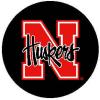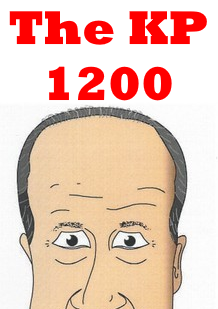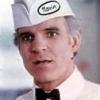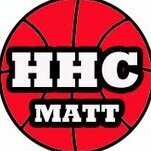Then & Now: Mike Naderer
Compiled By Dave Brandon
(Photo Courtesy NU Media Relations)
 Mike
Mike
Naderer played at Nebraska from 1978-1981, and is among
the Top 60 scorers in NU history (657 points). Naderer
started at guard for parts of each of the four seasons
he played at Nebraska, and played for both Joe Cipriano
and Moe Iba.
Naderer
is our latest Sunday guest on this edition of "Then &
Now."
HHC: Mike, thanks for taking a trip down memory
lane with us. We've always wondered, where did your
nickname of "Skater" come from?
MN: Oh, I had some high school kids
actually name me that. I don’t know if you remember Nate
Archibald that played at UTEP, but his name was “Nate
the Skate.” But anyway, that worked into Skater because
it rhymed with Naderer, so it was pretty simple. Do you
remember him?
HHC: Yeah, I remember the name.
MN: Yeah, he
played for three or four NBA teams, Nate “Tiny”
Archibald. Guys my age will remember who he was.
HHC: You were one of the most heralded
high school players in the southwest, as you came to
Nebraska from Scottsdale, Arizona, after averaging 22
points, 12 assists, and 6 steals as a high school
senior. What was your reason for coming to Nebraska, and
what did you know about Husker Hoops before coming to
Lincoln?
MN: I actually had followed pretty much
all of the basketball in the Midwest. One reason is that
when I visited there, I was just really impressed with
the new Bob Devaney Sports Center, which was like two
years old at that time.
But it
was just great people, and the whole academic
administration was tremendous back then. When they
recruited me, they did a great job, and it felt like I
was high on their list, so I had visited some other
places, but when I visited there, they pretty much sold
me on Lincoln.
HHC: Talk to us about Joe Cipriano, as far
as what kind of man he was, and how was your
relationship with him?
MN: He was a great man. I still am very
good friends with his son today, and we see each other
once a year or so. And Joe was the one who brought me
in, and obviously gave me my first chance to start as a
freshman, and had confidence enough in me that it worked
out for me, because I got to play quite a bit those four
years.
He was
just a great man, and he was the Dean of the Big 8 at
the time, and having read on him when they were
recruiting me from pamphlets they sent, he was probably
the main reason that I attended the University of
Nebraska.
HHC: As a coach, how would you describe
Joe Cipriano and what he believed in?
MN: You know, I wasn’t really big in stature, if
you remember, and he was probably the same way when he
played in college. He gave me a lot of confidence and
said that “you don’t measure what’s inside people, as
far as the heart,” and he gave me my first shot. He was
very firm and stern, but also very fair, and gave his
players free reign within the system, and gave everyone
an equal shot, and I think that’s all you can ask for
from any coach.
HHC: Your freshman year at Nebraska was
1977-1978, and you started 16 of the 28 games while
"battling the flu" half of the season. How did that
hinder you, and what exactly did you have?
MN: Well, I got my first start the very
first game against Missouri Southern and played pretty
well. And then I started like the next 14 or 15, and
then my only two games that I missed in my entire career
were that year and due to the flu. I remember coming
back from the Oklahoma State trip and it knocked me
down, and I battled it for the next week or two, but I
did get to play quite a bit that last half of the year.
And I’ll tell you what, we had a good team that year,
and that was before they enlarged the tournament to the
field of 64, and if it were today’s game, we probably
would have been in the NCAA had it been larger.
But
yeah, my freshman year was probably out most successful
overall.
HHC: Let’s talk a little bit more about
that year. For the season, you guys finished 22-8,
making the school's first post-season appearance (2nd
Round of NIT) since 1966-1967. On that team were players
like Brian Banks and Carl McPipe. Talk about how special
it was playing with those guys, and what you remember
from that year?
MN: I came in and played alongside Brian,
and I felt that Brian, when he was a junior, was
probably the best guard in the Big 8, and at both ends
of the floor. There were some great ones with Darnell
Valentine and Larry Blackman, but Brian was right up
there. With Brian, I thought that I played against the
best guard in the conference each day in practice.
And Carl
McPipe was a great inside post man at his size, as he
was only about 6’6”. He wasn’t real big, but he did
really rebound well, and shot the ball midrange real
well. Terry Novak, who is one of my best friends to this
day, was one of the small forwards on that team, and he
was just such a great role player. And we had Curt
Hedberg and Andre Smith, who was also a freshman
alongside me, and we did most of the playing from the
freshman standpoint.
But all
those guys were great to play with, and it was a great
team that meshed together, and I think we were like 11-0
or 12-0 before we lost one, and maybe made the Top 20
that year, although we ended up losing to Texas in the
second round of the NIT, though they went on to win the
NIT.
All in
all, it was a great year, going away from home and
having success that early in my career.
HHC: 1978-1979 was your sophomore season,
and you started all but three games in the Husker
backcourt on a team that went 14-13. The strength of
that team was defense, which you ranked ninth nationally
in, and first in the Big 8. How much of that defensive
success was due to Moe Iba?
MN: Probably
100% of it. Coach Cipriano had really let Moe take over
the reigns coaching wise at that time, especially
defensive schemes in practice. Moe was such a great
defensive coach, and he demanded it number one, and you
pretty much didn’t play at the University of Nebraska
unless you could play solid defense. And he got that
point acrossed and really sold it, and the players
bought into it, so that’s probably why we were so
successful defensively.
HHC: Was it after the 1979 season that you
found out that Cip had cancer, or was it not until the
beginning of the following season?
MN: It was
more the beginning of the following year. I remember in
the fall we came back, and we knew he had been
diagnosed, we just didn’t know how severe. And he
battled it, and I think we took a trip to Hawaii, and we
came back, and it just got worse as the days went by.
But he did make his trip to Hawaii, and I think that was
one of his goals, and he was pretty much with us right
until the very end, until it just got to the point where
he couldn’t attend games.
HHC: 1979-1980
was your junior season, and you guys finished 18-13 with
another NIT appearance, while also finishing 2nd in the
Big 8. How special was it having Joe Cipriano be there
on the bench for that season while Moe Iba helped out as
Associate Head Coach?
MN: It was a
great experience for both of them. They were great
coaches, and both complimented each other as coaches.
They had a great, strong relationship, and they just
worked so well together. And it was just easy as a
player to fit into their system, and they gave you a lot
of support, but yet they pushed and drove you to be a
better player and do well in the classroom and do things
on and off the court in a respectful manner. You
couldn’t ask for two better college coaches to play for.
HHC: Prior to your senior season of
1980-1981, Cip continued to become seriously ill, before
ultimately passing away a few days before the season
opening game against Wyoming. What do you remember about
this, and how difficult was it to go through?
MN: I remember
doing an interview on TV right before the Wyoming game
after he had passed. It was a difficult period for most
of us, and personally for me, because I had a lot of
respect for him, and he obviously gave me a great chance
to play at that level.
And like
I said, he was the reason I came there, and my parents
were really impressed with him when he came to Arizona
to recruit me. And he just followed through and showed a
lot of care for his athletes. It was just a very hard
time for a week or two right after that, and probably,
as most people remember, it was easier to just play for
him and stay busy when you go trough something like
that.
But it
definitely affected us in the next couple of weeks and
months to follow, and then you go through that phase of
grief, and then afterwards, when the season ends, it
really sinks in.
HHC: What do you remember about the last
time you saw Cip, as far as what he said or what sticks
out?
MN: I remember visiting him at his house,
and again, Terry Novak and myself had gone over there
and visited him at the time, and a couple people were
over, and I don’t really remember who, but we just
wanted to see him. We knew it was kind of getting late,
and we didn’t know how much longer he’d be with us, and
it seemed like within three or four days after that, it
happened.
It was a
real special time because it was pretty much just the
three or four of us in there, and we spent some good
quality time with him. And it became very sad, but as
Terry and I remember looking back, we got to see him in
pretty good spirits the last time, and it just was very
special.
HHC: Moe Iba
took over as head coach for your senior season of
1980-1981, and your team went 15-12. Do you feel that
team rallied around Coach Iba and Cip and overachieved,
or was it right about where it should have been?
MN: It
probably was right about where it should have been. That
year I don’t know if we lost Ray Collins for a little
bit to a broken foot, but I think that was the year, and
at the time, we were at Colorado, and were playing well,
and we were near the top of the Big 8. And he broke his
foot, and that really hurt us, because we really lost a
solid player in Ray, and probably didn’t recover as a
team because he was really solid offensively and
defensively. And we kind of went on a downward spiral,
and we lost to Colorado at home in the first round of
the playoffs. They had Jo Jo Hunter, and he scored a
bunch on us, and they were just ready for the game and
upset us at home.
HHC: In that season, Andre Smith was Big
8 Player of the Year. Talk about what kind of player and
teammate he was?
MN: Andre was a very good player. Again,
another post player probably undersized, and that was a
credit to Coach Iba and Cipriano. We weren’t real big,
and Andre was the same size as Carl. They were just
great players who learned to play with their backs to
the basket. And we ran a motion offense, and learned how
to pass the ball real well, inside and out, and it
really allowed them to score.
Both of
them took advantage of that offensive system. And Moe
did a great job with Andre and Carl, as far as
instructing individually in the post. They were very
skilled, but I think Coach Iba got the most out of all
of us. We may not have been the most skilled players in
the Big 8, but we seemed to play harder than everybody.
HHC: And what about Jack Moore? What was
he like, and did you keep in touch with him at all upon
leaving Lincoln?
MN: Yeah, I did, until his passing in the
tragic plane crash. But Jack, at his size, overachieved
at everything. You couldn’t take the basketball from him
- he was very solid offensively. He was a great free
throw shooter, and obviously above average outside
shooter, but really took the ball to the basket. They
list him at 5’8 or 5’9, and he was just unbelievable to
play with. He was very good with setting you up, and
that’s basically where I got my points, when I did
score, was from him. He was very good at penetrating and
drawing help and then kicking it to the open person.
HHC: What are your favorite memories off
the court at Nebraska, and when was the last time you
were in Lincoln?
MN: Last time I was in Lincoln was… Well,
I usually visit once a summer to play golf, and I’ve
taken my son back to two football games. Probably one of
the most favorite memories of recent time has been
taking my son Andrew, who is 11, with me. I took him
back two years ago to see his first football game, and
again, we stayed with Terry. And we got him into a Big
Red football game.
I think
that kind of bonding, taking your son, is great. And I’m
still trying to take him back to a basketball game. And
I think we may be playing in a very competitive baseball
tournament in Omaha, so we’re looking to come back there
in June.
HHC: Do you keep up with the current team
at all?
MN: I do. In fact, we bought a game on
ESPN Full Court last night (Tuesday night, January 17,
2006). I saw them play not so well against Iowa State,
but I’m excited for them, and maybe somebody can slow
Texas down, and maybe the rest of the league can catch
them. Looks to me that after Texas, it looks wide open,
but I was hoping they’d protect their home court last
night, but maybe they’ll beat Kansas. So it looks like
maybe they can go down there, and if they play a little
bit better, beat them.
HHC: We’d like that! Finally, what is Mike
Naderer up to these days, and what has he been doing the
last 25 years?
MN: When I left Nebraska, I coached for
six years at the college level. I did a grad assistant
job at Nebraska, and then went to Drake and Baylor. Then
I moved back to Arizona after six years and took over
the head-coaching job at Coronado High School in
Scottsdale Arizona, and I currently live in Phoenix,
which is right next door.
But I
coached there for fifteen years, and just resigned two
years ago so I could spend more time with my family and
my son, and he’s very involved with youth sports. And I
teach in the school system here, it’s my eighteenth
year, and I’m an elementary physical education teacher,
so I’m still heavily involved in youth sports, with
Arizona Youth Basketball and Youth Baseball. So, I spend
a lot of time at basketball gyms or baseball fields.
HHC: That’s a
good life right there!
MN: (Laughs)
You got it.
HHC: Hey, if
we set you up an email account at
[email protected] , would you be willing
to take some e-mails from our readers?
MN: Sure.
HHC: Awesome. Thanks a lot for your time
Mike, and anything else you'd like to add?
MN: No, this was great. I appreciate you
contacting me and thinking about us old timers.<script type="text/javascript" language="javascript">





Recommended Comments
There are no comments to display.
Join the conversation
You can post now and register later. If you have an account, sign in now to post with your account.